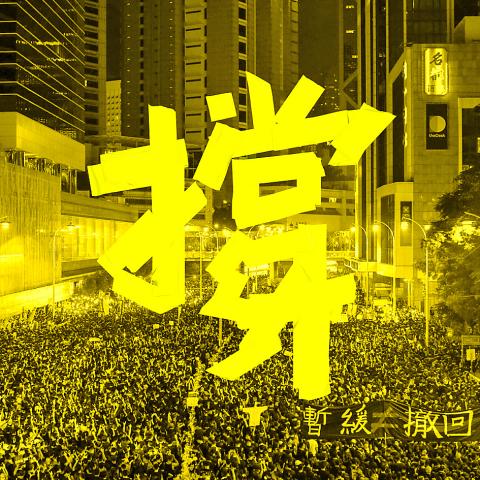More than 20 Taiwanese and Hong Kong singers, composers and other music professionals have produced a song in support of Hong Kongers opposing a proposed extradition bill, who are tomorrow to take to the streets again to demand the bill’s withdrawal.
The song, released on Friday, is titled Cheng (撐) in Mandarin, which roughly means “support” or “having one’s back.”
The character is part of the slogan Taiwan cheng Xianggang (“Taiwan supports Hong Kong,” 台灣撐香港), which was chanted by demonstrators who earlier this month rallied in Taiwan to support the Hong Kong protests.

Photo provided by Blaire Ko Music Studio
“The idea of producing the song came after some of us talked about [the protests] two weeks ago,” said award-winning Taiwanese music producer Blaire Ko (柯智豪), who oversaw the song’s production.
Ko said they came together just days after a large protest in Hong Kong on June 12.
The scale of the protests left a deep impression on him and many others, he said.
They also took action because they thought that the protests underscored the need for the world to pay attention to the suppression of freedoms, he said.
The music was composed by Poki Wu (吳永吉), the lead singer of Taiwanese rock band The Chairman (董事長樂團), and the lyrics were written by Golden Melody best songwriter award winner Wu Hsiung (武雄) and Hong Kong lyricist Albert Leung (林夕).
Others who took part in the project include Taiwanese indie band Fire Ex (滅火器), Amis singer Panai Kusui, Hong Kong Canto-pop singer Denise Ho (何韻詩) and Hong Kong singer and record producer Anthony Wong (黃耀明).
Through the song, they wanted to send the message that “no matter how small an individual is, they all aspire to have their own voice,” Ko said.
“Although it is raining now, we hope the road ahead will only be brighter and brighter,” he said.
The bill has raised concerns that it could threaten the rights of Hong Kongers, as it would allow the authorities to extradite criminal suspects to China.
The Hong Kong government on June 15 caved in to public pressure and indefinitely suspended the bill, but protesters deemed the move as a delaying tactic and demand that the bill be permanently withdrawn.

Trips for more than 100,000 international and domestic air travelers could be disrupted as China launches a military exercise around Taiwan today, Taiwan’s Civil Aviation Administration (CAA) said yesterday. The exercise could affect nearly 900 flights scheduled to enter the Taipei Flight Information Region (FIR) during the exercise window, it added. A notice issued by the Chinese Civil Aviation Administration showed there would be seven temporary zones around the Taiwan Strait which would be used for live-fire exercises, lasting from 8am to 6pm today. All aircraft are prohibited from entering during exercise, it says. Taipei FIR has 14 international air routes and

Taiwan lacks effective and cost-efficient armaments to intercept rockets, making the planned “T-Dome” interception system necessary, two experts said on Tuesday. The concerns were raised after China’s military fired two waves of rockets during live-fire drills around Taiwan on Tuesday, part of two-day exercises code-named “Justice Mission 2025.” The first wave involved 17 rockets launched at 9am from Pingtan in China’s Fujian Province, according to Lieutenant General Hsieh Jih-sheng (謝日升) of the Office of the Deputy Chief of the General Staff for Intelligence at the Ministry of National Defense. Those rockets landed 70 nautical miles (129.6km) northeast of Keelung without flying over Taiwan,

City buses in Taipei and New Taipei City, as well as the Taipei MRT, would on Saturday begin accepting QR code payments from five electronic payment providers, the Taipei Department of Transportation said yesterday. The new option would allow passengers to use the “transportation QR code” feature from EasyWallet, iPass Money, iCash Pay, Jkopay or PXPay Plus. Passengers should open their preferred electronic payment app, select the “transportation code” — not the regular payment code — unlock it, and scan the code at ticket readers or gates, General Planning Division Director-General Liu Kuo-chu (劉國著) said. People should move through the

The Ministry of National Defense (MND) today released images of the military tracking China’s People's Liberation Army (PLA) movements during the latest round of Chinese drills around Taiwan. The PLA began "Justice Mission 2025" drills today, carrying out live-fire drills, simulated strikes on land and maritime targets, and exercises to blockade the nation's main ports. The exercises are to continue tomorrow, with the PLA announcing sea and air space restrictions for five zones around Taiwan for 10 hours starting from 8:30am. The ministry today released images showing a Chinese J-16 fighter jet tracked by a F-16V Block 20 jet and the